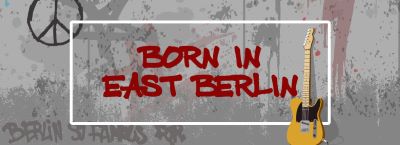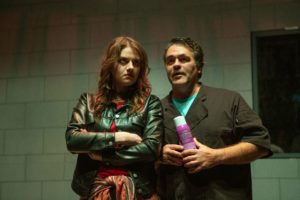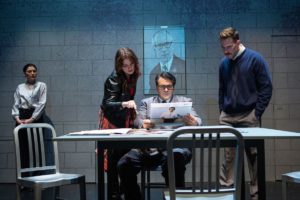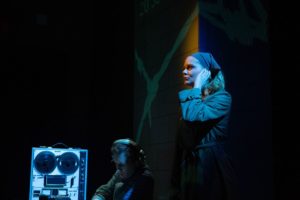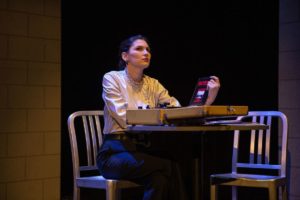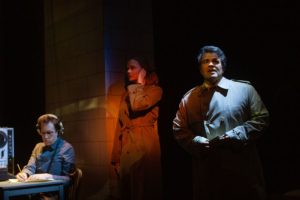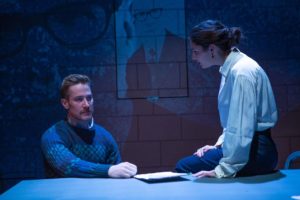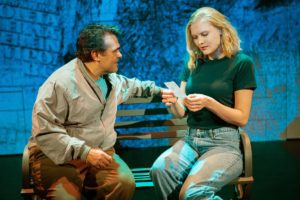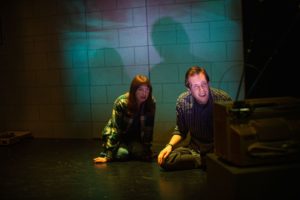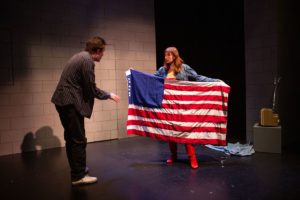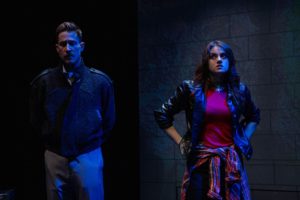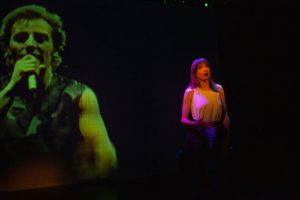REBIRTH
Which walls are worse? Those that keep people out or those that keep people in? Playwright Rogelio Martinez seemed to have this question in mind when he wrote Born in East Berlin, which is being given its world premiere at the Creativity Theater thanks to San Francisco Playhouse’s Sandbox Series, and it is this question that keeps us intrigued despite the play’s flaws. Even when the goods are not delivered, there is a difference between a play whose intentions are intelligent and serious and a play that asks nothing but that we have a fun night out.
Not that Martinez’s play isn’t entertaining; it’s just that it makes demands on our consciousness that require even deeper intellectual probing than its author, at the moment, seems ready to fully explore. But its first images are devastating. We see David Bowie performing at his famed concert in West Berlin on June 6, 1987 at the German Reichstag, close enough to the wall so that thousands of young people on the other side were rapt listening to the music. We then cut swiftly to a grim little office in East Berlin, where an American emissary, Anne, is struggling with a trio of bureaucrats to get a contract signed that will allow Bruce Springsteen to perform on East German soil. Since we know that Springsteen gave that memorable and socially significant concert on July 19, 1988, we also know that, despite the tension between Anne and the authorities, Anne (and Springsteen) will ultimately triumph, which, in a sense, lowers the suspense element.
Still, the writing is terse and engaging and the first act moves at a nice pace, and we become so embroiled in the characters that, for the length of the act, suspense is not what keeps us in our seats. It is the people. And, of course, there is rock and roll itself — the play is a variation on a theme given eloquent voice in Tom Stoppard’s Rock ’n’ Roll, which took place in Prague and London ten years earlier — and the stunning impact that this musical phenomenon had on the world and, perhaps most of all, on the parts of the world that tried desperately to keep it out by declaring it “decadent” and worse. Indeed, it is often thought that the Bowie and Springsteen concerts were the catalysts for bringing down the Berlin Wall a mere year later in 1989. It’s a part of our own history forever linked to the history of a part of the world that our music changed forever.
The vividness of Anne also keeps us in our seats, because Ash Malloy, who brings her to life, is such a thrilling presence. Her combination of passion, pragmatism, innocence and, at the same time, in the eyes of her adversaries, her brazen sexuality informs her every movement on stage. It is hard to avert one’s eyes from Ms. Malloy; one looks forward to seeing her again. It helps that she is Martinez’s most striking and original creation. We know her. She is us.
The problem with the East German characters is that, despite some trenchant, often poetic dialogue and, despite how much Martinez seems to like them as individuals, they often remain tied to a dour stereotype of Communist bureaucracy. This is particularly true of the stern, uptight Lotte and the emotionally inexperienced Hans, nicely played by Lauren Hart and Patrick Andrew Jones. Ms. Hart, thanks to Margaret Perry’s astute direction, is particularly good, her sharp approach to Lotte punctuated by some delicious comic business. Isabel Langen, who plays Lotte’s more spirited sister Katja who is transformed into Springsteen’s dancing partner at the concert (a fine meshing of fictional character and real person), has a remarkable and exhilarating monologue about the freedom she felt from the experience and it becomes the play’s richest, most unforgettable hurrah.
Ms. Perry’s direction keeps all her actors, some playing multiple parts, on their toes. But as the stereotyping gets more accented, and the characters tend to lose humanity as a result, the second act grows more indifferent and predictable until one’s interest flags, and the final moment, intentional or not, seems oddly inconclusive. It is a shame, because there is enough pungent stuff in Born in East Berlin to suggest that, with tightening and a frankly more realistic picture of its East Germans, Martinez might yet turn this play into something both more substantial and more satisfying.
photos by Jessica Palopoli
Born in East Berlin
San Francisco Playhouse
The Creativity Theater
The Children’s Creativity Museum, 221 4th St.
Thurs at 7; Fri and Sat at 8; Sat at 3 (show times vary)
ends on February 29, 2020
for tickets ($30-$40), call 415.677.9596 or visit SF Playhouse
